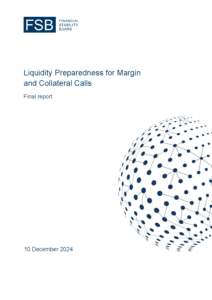Press enquiries:
+41 61 280 8477
[email protected]
Ref: 36/2024
- Policy recommendations aim to enhance the liquidity preparedness of non-bank market participants for margin and collateral calls in centrally and non-centrally cleared derivatives and securities markets.
- Recommendations follow public consultation and focus on liquidity risks arising from spikes in margin and collateral calls, including during times of market-wide stress.
- Recommendations cover liquidity risk management and governance, stress testing and scenario design, and collateral management practices of non-bank market participants.
The Financial Stability Board (FSB) today published policy recommendations to enhance the liquidity preparedness of non-bank market participants for margin and collateral calls in centrally and non-centrally cleared derivatives and securities markets (including securities financing such as repo).
The recommendations respond to calls for regulatory adjustments to deal with liquidity strains in the non-bank financial intermediation (NBFI) sector arising from spikes in margin and collateral calls during market stress. The recommendations are intended to build on and complement rules and regulations for liquidity risk management and governance that already exist in many sectors and jurisdictions.
Derivatives and securities activities can expose market participants to margin and collateral calls. Recent episodes of market stress, including the March 2020 market turmoil, the Archegos failure in March 2021, the 2022 turmoil in certain commodities markets, and the September 2022 issues experienced by many pooled liability-driven investment (LDI) funds, underscore the importance of margin and collateral calls to financial stability and the need for market participants to be prepared to meet these calls.
The FSB’s eight policy recommendations cover liquidity risk management and governance, stress testing and scenario design, and collateral management practices of non-bank market participants, focussing on liquidity risks arising from spikes in margin and collateral calls during times of market-wide stress. The recommendations cover both centrally and non-centrally cleared derivatives and securities markets and apply to a broad range of non-bank market participants that may face margin and collateral calls, including insurance companies, pension funds, hedge funds, other investment funds, and family offices.
Non-financial entities such as commodities traders can also have material derivatives and securities exposures. While the recommendations do not directly apply to such entities, they and their counterparties could use the recommendations to improve their liquidity management and governance practices.
Notes to editors
This work forms part of the FSB’s work programme on enhancing the resilience of NBFI. It follows up on the findings of a review of margining practices conducted in 2022 by the Basel Committee on Banking Supervision (BCBS), Bank for International Settlements’ Committee on Payments and Market Infrastructures (CPMI) and the International Organization of Securities Commissions (IOSCO). The review recommended that the FSB undertake additional international work on enhancing liquidity preparedness of market participants and on regulatory data gaps, so that authorities can better monitor the NBFI sector’s liquidity preparedness.
The FSB launched a public consultation on its proposed recommendations to enhance the liquidity preparedness of non-bank market participants for margin and collateral calls during times of market-wide stress in April 2024. The overview of the responses to this consultation has also been published today.
Further details on the FSB’s work programme to enhance resilience in NBFI can be found in its latest progress report.
The FSB coordinates at the international level the work of national financial authorities and international standard-setting bodies and develops and promotes the implementation of effective regulatory, supervisory, and other financial sector policies in the interest of financial stability. It brings together national authorities responsible for financial stability in 24 countries and jurisdictions, international financial institutions, sector-specific international groupings of regulators and supervisors, and committees of central bank experts. The FSB also conducts outreach with approximately 70 other jurisdictions through its six Regional Consultative Groups.
The FSB is chaired by Klaas Knot, President of De Nederlandsche Bank. The FSB Secretariat is located in Basel, Switzerland and hosted by the Bank for International Settlements.
